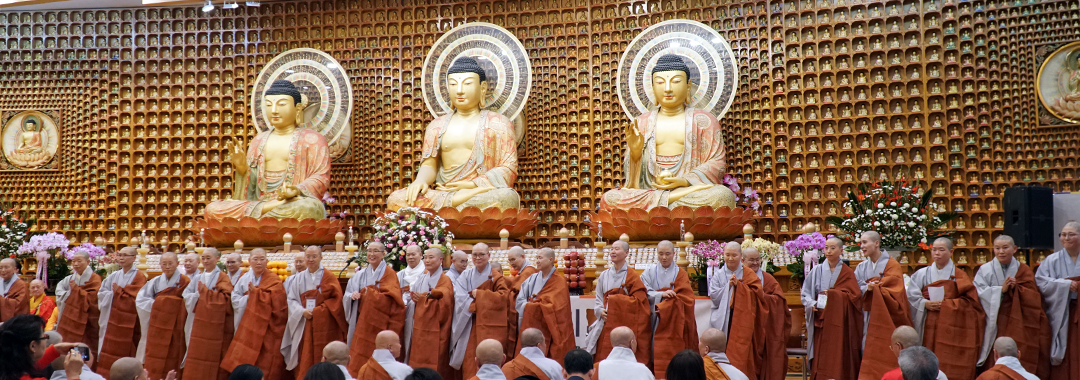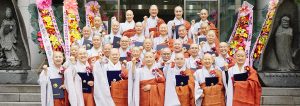
The appointment ceremony for the 12th National Bhikkhuni Association
In November 2019, the 12th executive branch of the National Bhikkhuni Association started its business. Sakyadhita Korea’s secretary general, Hanul Kim, and publicity assistant, Sydney Thompson, thereby visited Haeyeon Sunim (the abbot of Beomyongsa Temple in the National Bhikkhuni Center), Sukyeong Sunim (the chief of the Korean Bhikkhuni Buddhist Research Center), Seolhae Sunim (the general manager) and Yujeong Sunim (the director of education) to interview them about their future plans.
The National Bhikkuni Association represents the over 6,000 Bhikkhuni sunims in Korea. The 12th president of the National Bhikkuni Association, Bongak Sunim is also a co-representative of Sakyadhita Korea. The 12th executive branch stated that it will do its best for the growth and development of Korean bhikkhunis.
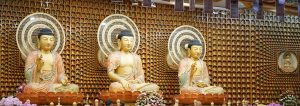
Main Buddha Hall
Haeyeon Sunim, the abbot of Beomyongsa Temple, introduced the themes of the Buddhist services to be held in the future. Beomyongsa Temple, in the National Bhikkhuni Center, plans to host Buddhist services every Sunday with a different topic each week. The theme for the first week is the Avatamsaka sutra, and meditation for the second. For the third week, the temple will invite outstanding bhikkuni sunims from all over the nation and hold a Buddhist service. The service for the fourth week will be hosted by Bongak Sunim, and the topic is expected to be an interesting take on the fundamental doctrines of daily life. Also, on the first day of the lunar calendar, the abbot of Beomyongsa Temple, Haeyeon Sunim, will be in charge. Because there are many people coming to pray on the first day of the lunar calendar, the temple is planning on hosting a Buddhist service that would be beneficial for those praying.
Furthermore, along with the launch of the 12th executive branch, the temple started a campaign to boycott the use of plastics and disposable items on its premises. As this campaign kicked off, big changes first took place in the kitchen. Thus far, the temple had been using plastic plates and disposable cups, but they stopped using these items. Effected by this campaign, many bhikkhuni sunims all over the nation actively began to participate in this environmental preservation movement in their own temples.
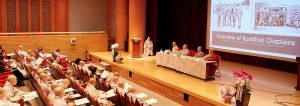
2018 “A New Horizon of Buddhism” Symposium
The chief of the Korean Bhikkhuni Buddhist Research Center, Sukyeong Sunim, explained the activity plans for the center. The center is planning to conduct research on the history and traditions of Korean bhikkhuni sunims, and then to share their findings with the public. The research center will also form a study group open to both sunims and Buddhist laypeople alike who have great interest in the history and activities of bhikkhunis for the free exchange of opinions and to discuss what activities are needed in this era. They will then develop programs based on the findings from the study group.
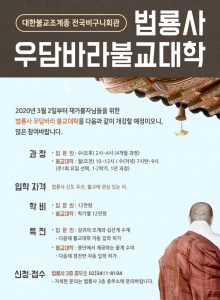 The director of education, Yujeong Sunim, explained the plans for the educational programs that the association will execute. In the future, the National Bhikkhuni Association is planning to run a chanting education program to assist bhikkhuni sunims with effectively carrying out various Buddhist rituals. Additionally, the association will run a Buddhist sermon education program to assist bhikkhuni sunims with Buddhist preaching. Moreover, the association will operate a foreign language education program for bhikkhuni sunims in order to assist them with running international exchanges in the future. On the other hand, for the laypeople, the association is also planning to run a Buddhist education program and cultural education programs to include making temple food, holding a tea ceremony, folk painting, doing traditional women’s arts and crafts, and flower arranging. The association is also planning to run a special education program for seniors age 70 and above. Finally, the National Bhikkhuni Association is also going to examine ways to provide assistance to foreign bhikkhuni sunims.
The director of education, Yujeong Sunim, explained the plans for the educational programs that the association will execute. In the future, the National Bhikkhuni Association is planning to run a chanting education program to assist bhikkhuni sunims with effectively carrying out various Buddhist rituals. Additionally, the association will run a Buddhist sermon education program to assist bhikkhuni sunims with Buddhist preaching. Moreover, the association will operate a foreign language education program for bhikkhuni sunims in order to assist them with running international exchanges in the future. On the other hand, for the laypeople, the association is also planning to run a Buddhist education program and cultural education programs to include making temple food, holding a tea ceremony, folk painting, doing traditional women’s arts and crafts, and flower arranging. The association is also planning to run a special education program for seniors age 70 and above. Finally, the National Bhikkhuni Association is also going to examine ways to provide assistance to foreign bhikkhuni sunims.
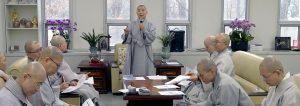
Meeting of the 12th executive branch of the National Bhikkhuni Association
Seolhae Sunim explained the organization of the National Bhikkhuni Association. According to Seolhae Sunim, the association is composed of the council of elder statesmen, the president sunim, the office of the deputy president sunim, the executive branch (the departments of general affairs, planning, finance, education, cultural missionary work, social welfare, international affairs; the Korean Bhikkhuni Buddhist Research Center; and Temple Food Research Center), assistant administrator sunim, Beomyeongsa Temple, and the office of librarians. Seolhae Sunim is in charge of the general affairs department, the main role of which is to support various administrative work for the smooth operation of each department.
The interview shows how hard these bhikkhuni sunims are working to assist with Buddhist activities and bhikkhuni sunim activities. The role of the National Bhikkhuni Association is anticipated to be evermore greater in the future.
(The National Bhikkhuni Center’s homepage: http://kbiguni.org)

